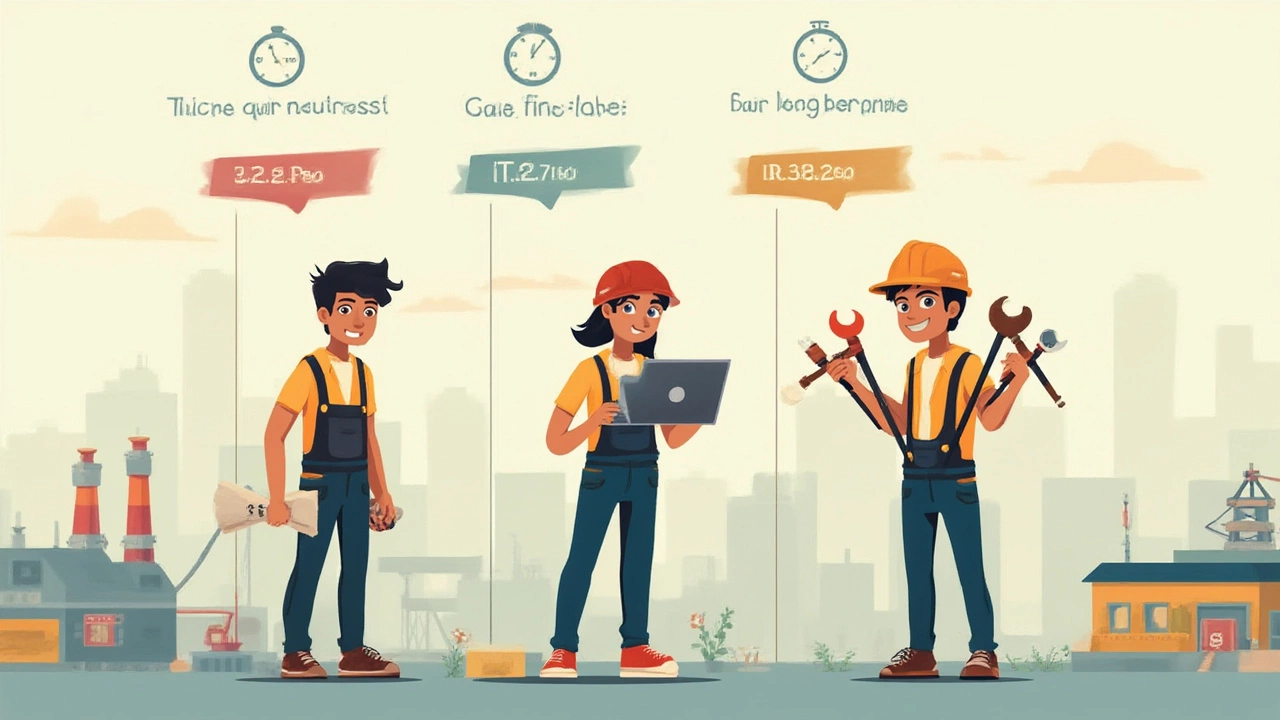
Ever wondered if there’s a quicker way into a solid career than slogging through three or four years of traditional university? Technical degrees might just be the answer. While they don’t get the spotlight as much as university routes, they’re the unsung heroes for people who want hands-on skills and a path straight into a job. But how long do these technical degrees actually take? There’s no one-size-fits-all answer: the length can vary a lot depending on what you study, how you study, and where you are in the world, especially in places like the UK where apprenticeships and diplomas have their own quirks. Let’s untangle the details.
What Is a Technical Degree, Anyway?
A technical degree isn’t a catch-all phrase. It covers a range of qualifications with one thing in common: practical skills, focused knowledge, and a clear route into fields like engineering, healthcare, IT, construction, and more. So, what makes a technical degree different from a standard university bachelor’s? Usually, it’s more condensed, with fewer essays and more labs, workshops, or hands-on work.
Think about what’s offered at UK colleges: HNDs (Higher National Diplomas), foundation degrees, or vocational qualifications like BTECs and NVQs. If you head to other countries, terms vary, but you’ll find the same spirit—skills first, theory second. In most cases, technical degrees skip the deep dive into pure academics and give you precisely what employers want in less time. That’s a huge plus if you want to dodge heavy student loans and enter the workforce faster.
The focus can be broad: from plumbing and electrical installation to computing, digital design, or medical lab tech. Employers—whether small local firms or big tech companies—actively look for technical graduates because they know you’ve done the graft, not just skimmed through textbooks. This hands-on angle is why technical degrees are getting a second look in today’s skills-hungry market.
Many routes start at Level 3 (A-level equivalent), like BTECs or T-Levels. Then you can jump to more advanced study—think HNC (Higher National Certificate; usually one year), HND (usually two years), or even leap into work through apprenticeships. If you go part-time or work-study, you get extra flexibility, but more on those timeframes later.
Let’s look at some legit UK examples. The HND in Engineering? That’s two years full-time, or three years part-time. A T-Level in Digital Production (which is catching on fast)? That’s two years straight out of school. Some diplomas in IT take a brisk 12 to 18 months full-time. The goal: Prepare you to start working with real-world skills, sometimes even before you finish the course thanks to work placements.
If you’re looking to boost your job prospects without losing years to study, a technical degree makes a lot of sense. It’s hands-on learning that lines up with where the jobs are. Still, you’ll want the facts before you plunge in—especially how long you’ll be hitting the books (or, let’s be honest, fixing engines and writing code).
Typical Lengths of Technical Degrees: Full-Time, Part-Time, and Apprenticeships
This is where things get practical. If you like clear cut answers, you’ll want to know: ‘Exactly how long will this take me?’ With technical degrees, program lengths can look short or long depending on your choices and your life outside of study.
technical degree programs at UK colleges (like HNDs or foundation degrees) are usually set up as two-year, full-time courses. These pack in just enough classroom learning mixed with hands-on workshops or work placements so you’re not just listening—you’re doing. If you decide that you only want the first year, you can often leave after one year with a Higher National Certificate (HNC). Same goes with other fields—the Certificate of Higher Education in Construction Management could be around 12 months full-time.
Table: Typical Durations for Common UK Technical Degrees
| Degree or Qualification | Full-Time Length | Part-Time Length |
|---|---|---|
| HNC (Engineering, Business, etc.) | 1 year | 1.5-2 years |
| HND (Engineering, Computing, etc.) | 2 years | 3 years |
| Foundation Degree | 2 years | 3-4 years |
| BTEC / T-Level (Level 3 after school) | 2 years | Varies |
| Level 4/5 Diploma | 1.5-2 years | Up to 3 years |
| Advanced Apprenticeship (NVQ Level 3/4) | 2 years | 2-4 years (work-based) |
Here’s the interesting bit. If you’re working—and who isn’t trying to keep up with the bills?—many technical degrees offer part-time options. This path usually stretches things by 1-2 years, so a two-year program full-time becomes three or sometimes four years if you go part-time. Part-timers often attend evening or weekend classes and complete assignments online or on the job.
Don’t forget apprenticeships—these are technical courses delivered mostly at work, blended with days at college. The official word is that advanced apprenticeships last around two years, but real life can get in the way and some people take up to four years. The upside? You’re earning as you learn, picking up experience in the real world, which often leads straight to a job with the employer who trained you.
Specialist fields can be even quicker. Example: Cisco Certified Network Associate (CCNA) training, which preps you for entry-level networking jobs, might be a quick five months for full-time learners. Medical laboratory tech diplomas often hit the 18-month mark in places like the NHS.
So, the length of a technical degree? Most are done in 1-2 years full-time. If you’re juggling work or family, part-time might fit better but could double your timeline. Either way, you skip the long, expensive haul of a traditional bachelor’s—unless you decide to “top up” to a full degree later. More on that in the next section.

Can You Speed It Up—or Stretch It Out?
Not everyone wants to—or can—drop everything for two years of straight study. The good news: plenty of technical degree pathways are made with flexibility in mind. Want to finish fast? Some colleges offer intensive or accelerated programs. For example, a Level 4 diploma in IT that’s normally 18 months might be wrapped up in a single year if you’re sharp and can handle the pressure. Intense, yes—but over even quicker.
If you have practical experience already—been working as an electrician, for instance—you might be able to gain credit for “prior learning.” That means you skip modules you’ve already mastered and head straight for the more advanced stuff, saving months or even a whole year off your qualification. Your college or training provider can tell you whether your previous jobs or certifications count towards course credits, so always ask upfront.
On the other side, if life is, well, life, and you need to stretch things out, it’s doable. Many programs let you study unit by unit, taking on one or two modules at a time. This approach works for parents, carers, or anyone stuck in a work grind. It’s slower—you could be looking at four years to complete an HND—but you’ll still walk away with the same qualification as the all-day students. It’s all about balancing what works for your life right now.
Blended learning is soaring in popularity after the pandemic. You’ll get part online, part hands-on classes, and you can replay recorded lectures at midnight if that suits your schedule. Video-based practical demonstrations, digital assignments, WhatsApp study groups—you name it, tech’s given technical degrees much more breathing space without skimping on that hands-on experience.
Here’s a practical tip: Always ask about “progression” when looking at technical degrees. Can you do another year and top up your HND to a full bachelor’s? Will your Level 4/5 diploma count towards a university degree if you fancy it later? Many UK colleges have clear routes for topping up, sometimes even with distance learning. That way, if you start technical and change your mind, nothing’s wasted.
And don’t forget specialisation. A broad HND might take two years, but a focused certificate—say in digital marketing software or plumbing basics—might be just 6-12 months. These shorter courses still count and often land you an entry job or promotion without stringing things out for years. Stacking short courses is now a recognised route in many sectors, a so-called “modular” approach to career building.
Weighing Up the Pros, Cons, and Career Impact
There’s no denying that the lure of quick job-ready skills is strong. A technical degree slashes the time—and cost—of study, sending you into the workforce while your old school mates might just be rolling into their second year of uni. But what about the trade-offs? There are a few things to consider.
First, job readiness. A technical degree’s whole point is giving you the skills to plug straight into an available job. In the UK, 84% of BTEC Level 3 Engineering graduates were in employment or further study 15 months after finishing, according to the Higher Education Statistics Agency (HESA, 2024). For comparison, some academic-only degrees lag behind that result. Employers want people who hit the ground running, and technical grads do just that.
Another plus: cost. College tuition for a two-year HND is much less than a university degree. On top of that, apprenticeship learners get paid to study, avoiding loans almost entirely. That pay-as-you-learn formula makes a technical route appealing if you’re not keen to take on debt.
Yet, some technical degrees might narrow your future options, at least at first. While HNDs, foundation degrees, and diplomas are respected, some employers or universities may see them as a level below a full bachelor's degree. If you want to move into management, teaching, or academic research, you'll often need to “top up” your qualification. Good news: most technical pathways now include options for further study if you want it.
You’ll also want to balance hands-on training with industry certifications if your field demands them. Think Microsoft, Cisco, or CompTIA badges for IT; Gas Safe for plumbers; City & Guilds for electrical work. Adding these to your technical degree keeps you at the top of the CV pile. In many sectors, these micro-qualifications are what get you hired—sometimes even more so than a formal diploma.
And here’s a final tip: speak to people who’ve already walked this path. Ask local employers what qualifications they respect most. Some sectors are crying out for technical grads—think construction, digital, and health tech right now—while others fill up faster. Get real feedback from recent graduates or careers advisors before you sign on the dotted line.
To sum up, technical degrees are all about speed, skill, and serious value for your time. Whether you want to power through in a year, blend your study with work, or future-proof your CV, there’s a technical route that fits. You just need to pick the pace that works for your life—and don’t be afraid to switch gears if your goals change along the way. The skills-first approach isn’t just a shortcut; for a lot of us, it’s the smart choice.
Write a comment